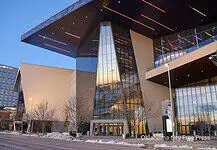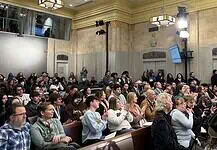OKLAHOMA CITY — James Cooper’s debut novel “Moonlit Massacre,” released on October 17 under the full moon, explores the 1978 Sirloin Stockade murders while tackling themes of violence, grief, race, and community resilience. At the book’s launch at Literati Press, Cooper shared his excitement, passion for horror, and the inspiration behind the novel.
Cooper, a Midwest City, Oklahoma native, has loved storytelling since childhood, inspired by everything from Nightmare on Elm Street to Care Bears. He holds degrees in Film Studies, English, and Creative Writing and currently teaches at Oklahoma City University. Though he’s written on topics like the 2013 Moore tornado and OKC’s LGBTQ+ community, “Moonlit Massacre” is his debut novel, with the first print selling out quickly and a second on the way.

Horror in humanity, humanity in horror: Themes explored in Moonlit Massacre
The Sirloin Stockade murders shocked Oklahoma as the state’s first mass killing. An armed man, with his wife and brother, forced six employees into the freezer of an Oklahoma City restaurant and shot them execution-style.
The crime terrified the community, especially after three more victims were found on a highway only weeks before. The shooter was executed in 1995, his wife received life sentences, and his brother died in a motorcycle accident.
In an interview with Free Press, Cooper explained that instead of retelling the actual murders, he introduces new characters and twists to explore the story’s human depth and trauma, keeping even those familiar with the Sirloin Stockade murders guessing.
“I wanted to create suspense around a story that people think they already know,” Cooper told Free Press. “By the end of chapter one, even those who know what happened in ’78 will think, ‘Oh no, I need to rethink this. This book is not going to be a safe ride.’”

The novel has resonated with horror fans who appreciate Cooper’s talent for building tension; one early reader texted him about an overwhelming sense of dread from an unexpected plot twist. Written in present tense, the book immerses readers in the unsettling events of an Oklahoma tragedy.
Concerned about society’s tendency to blame media for violent acts, especially mass shootings such as the 1999 Columbine tragedy, Cooper began to examine the deeper societal implications of violence.
“I had a feeling we were missing the mark on why these mass shootings happened, and that they were going to get worse,” he told us.
This realization ignited a desire to explore the effects of tragedy through storytelling.
“This is a story about trauma, childhood trauma, generational trauma,” he said about “Moonlit Massacre.”

Cooper initially planned an academic book on media violence but spent years hunkered down at Clarity Coffee, ultimately crafting “Moonlit Massacre.” The novel’s focus on personal and generational trauma, grief, and community resilience is particularly relevant to Oklahoma, a state that has faced tragedies like the Oklahoma City bombing and severe tornadoes.
“People around here want to hear about themselves, and they don’t often get that,” Cooper told us.
Cooper believes that horror, often dismissed as lowbrow, helps people confront darker emotions and reflects societal truths.
“When we classify people as monsters or pure evil, it’s an easy way to disavow our own capacity for darkness,” he stated. “We convince ourselves, ‘I would never commit a monstrous act.’ But the truth is, those who commit such acts likely thought the same before they did. Horror forces us to confront that part of ourselves—not to shame us, but to help us reconcile and become whole.”
As “Moonlit Massacre” hits the shelves, Cooper’s unique perspective on horror—reflecting real-life struggles—promises to resonate with, and perhaps even challenge, readers.
“I think horror acts as a boot camp for the psyche, allowing readers to process chaotic emotions and the darker aspects of humanity,” Cooper said.
Oklahoma’s past and present
In “Moonlit Massacre,” Cooper’s historical focus includes pivotal moments in Oklahoma’s urban and rural history, such as the decline of main streets in cities like Oklahoma City and towns like Sulphur and the Sirloin Stockade murders.
“It’s about the death of America’s Main Streets,” he told us. “Oklahoma City has main streets just as much as Sulphur does. And they were really starting to find themselves gutted heading into the ’80s.”
In “Moonlit Massacre,” Cooper presents a researched examination of Oklahoma’s past, encouraging readers to confront themes of violence, loss, and resilience. This focus aligns with his role as a City Councilor for Ward 2 in Oklahoma City, where he advocates for mental health initiatives and improvements in community quality of life.

He supports public transportation, walkability, and solutions for homelessness through projects like MAPS 4 and Better Streets. By prioritizing public safety, Cooper seeks to revitalize neighborhoods such as The Paseo and the LGBTQ+ district on 39th Street.
“The next 10 years of OKC’s future is the sequel to this book,” said Cooper.
Celebrating the Release of Moonlit Massacre
Cooper’s debut release party at Literati Press in Oklahoma City was a vibrant celebration, attracting a diverse crowd, including sludge metal band members and state representatives. Cooper was moved to tears by the turnout as guests filled the cozy venue, with bookshelves pushed aside to create space. Attendees read along with their copies and explored other Oklahoma titles like “Killers of the Flower Moon” and books on the Tulsa Race Massacre. He also acknowledged notable attendees like Councilperson Nikki Nice, Councilperson Barbara Peck, and former Mayor Ronald Norick.

Charles Martin, founder of Literati Press, expressed enthusiasm for Cooper’s debut novel release, noting the event drew a larger-than-expected crowd and showcased strong community support.
“We knew James Cooper was going to be a good draw,” Martin said. “He’s got a lot of friends, he’s got a lot of advocates, so we anticipated a big crowd…but we simply could not have fit another person in the store,” Martin told Free Press in an interview.

He praised the novel’s quality and launch excitement, aiming to reach audiences beyond Oklahoma City and portray Oklahoma as a complex character with both flaws and redeeming qualities.
“The book itself is absolutely fantastic,” Martin said. “We’re so confident in it. We’re really proud of it. I think this book has the opportunity to open people’s eyes to our humanity.”
The evening included a public reading where Cooper shared excerpts from “Moonlit Massacre,” showcasing vivid imagery like a 1967 Chevy pickup and abandoned movie theaters. He expressed gratitude to contributors and invited questions about his inspiration, publishing process, and strategies for overcoming anxieties, deepening guests’ connection to the book’s themes.
Attendee Jonny Muñoz praised “Moonlit Massacre” after reading an advance copy, noting the captivating opening that prompted him to explore its historical context. He highlighted how Cooper’s passion enhances the horror narrative, making the novel both a compelling horror story and a celebration of Oklahoma’s rich history and culture.
“James Cooper’s love for the city and for the state transcends on every word on every page,” Muñoz said. “It’s just genius. Listening to it a second time, I’m even more in love.”

The release of Moonlit Massacre not only showcased Cooper’s work but also fostered the community he often describes—eager to learn, ask questions, and grow together in a warm, inviting atmosphere. His novel resonates with readers by exploring the scars of violence while celebrating the resilience familiar to many in Oklahoma City.
With “Moonlit Massacre” now available in bookstores and on various platforms, Cooper looks forward to engaging readers in discussions about Oklahoma’s history, the narratives that shape our identity, and their implications for our future.
Zoe Elrod covers events and happenings around Oklahoma City for Free Press bringing her skill as a reporter and photographer. Zoe has spent her career covering local musicians, artists, politicians, and everyday folks.











